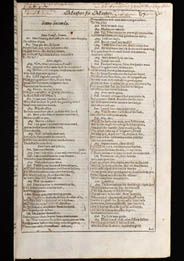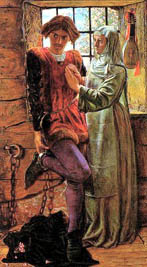REFLECTIONS ON MEASURE FOR MEASURE

A STUDY OF MEASURE FOR MEASURE
(including a feminist commentary)
According to E. Schanzer in Shakespeare's Problem Plays, a problem play is...
"A play in which we find ourselves concerned with a moral problem which is central to it, presented in such a manner that we are unsure of our moral bearings, so that uncertain and divided responses to it in the minds of the audience are possible and even probable."
from The Problem Plays of Shakespeare: A Study of "Julius Caesar," "Measure for Measure," and "Antony and Cleopatra" (1963).
Check this link for an overview of the the problem play's characteristics by Daniel Colvin.
REFLECTIONS ON MEASURE FOR MEASURE

By advancing precise and convincingly opposite conclusions, Bloom (Shakespeare, The Invention of the Human), and Steven Marx (Shakespeare and the Bible) clearly define why Measure for Measure defies easy classification. Does the play dramatize nihilistic cynicism or biblical redemption? We do indeed confront a "problem'" when two scholars advance such divergence--truly perspectives that invite a dilactical inquiry. Such will be our goal--to inquire.
By locating this play in the canon, does it embody elements of what we have seen? Philosophically, what reality or realties emerge? Is the universe consistent? Is its "sense of life?" (the 'pre-concpetual equivalent of metaphysics' to quote Ayn Rand) even definable? I have noted elsewhere on this sight four philosophical / historical perspectives that might apply here:
A good article by G.Wilson Knight, Measure for Measure and the Gospels, is found in The Wheel of Fire, and is reprinted in the Signet Classic edition of the play (New American Library, 1964). Knight argues that, "...we have a careful dramatic pattern, a studied explication of a central theme: the moral nature of man in relationship to the crudity of man's justice, especially in the matter of sexual vice." It would be instructive to compare his views with Bloom's...
Described below are the needed biblical allusions--Shakespeare alluded to Sacred Scripture in the canon more than any other source. Good Friday imagery dominates Macbeth, Lear echoes Job, and Hamlet speaks of hell, purgatory, and "providence in the fall of a sparrow." A good study of Biblical imagery / allusions in Shakespeare is Shakespeare and the Bible by Steven Marx (Oxford University Press, 2000). Chapter 5 (Truth Lies and False Truths) considers Measure for Measure.
Check as well, Bloom's SHAKESPEARE THE INVENTION OF THE HUMAN--does Bloom's thesis that Shakespeare "invented personality" apply to MEASURE FOR MEASURE? Consider the following as you look at Chapter 22 on the play. (The book is in the library on reserve):
Marx's analysis in Chapter V, using dozens of Biblical allusions, will reach conclusions quite different from Bloom...
Note some of the problems below and additional sources...?
1. Is the play a comedy or a tragedy?
2. Lying--see references below to "the noble lie" of Plato
3. The corruption of those in authority--see # 4 below for some sources
4. Politics, marriage law and its enforcement: Renaissance marriage law was complex. Please do the following:
BIBLICAL ALLUSIONS (see Marx's book, Chapter 5 as noted above):
The Central passage:
"Judge not, that ye be not judged. for what with judgment ye judge, ye shall be judged, and with what measure ye mete, it shall be measured to you again" (MATT: 7, 1-2). See V,i, 405 ff in which the Duke paraphrases the passage.

For Marx's, analysis, consult the following:
MAJOR CRITICAL ISSUES:
1. Allegorical--in the tradition of Medieval drama, do these characters represent more than their literal presence on stage? How didactic is the play? Does it fulfill the pragmatic theory of Sidney's Apology for Poetry?
2. morality play--a comparison to Everyman as a generic play might be fruitful?
3. Coleridge: "a hateful work" "the only painful play"--Coleridge's reaction was interesting. Although a moral puritan in his own life, enduring an unhappy marriage when romantics conventionally were unconventional, he nonetheless wrote gothic poetry that betrayed a haunted consciousness. Does this "fair is foul" paradox illuminate our understanding of the play. Maybe given his biography, it was a bit too painful for him, personally: CLICK HERE.
6. question of human and divine authority-Pope's article as listed above offers an illuminating commentary. Recall to what we said regarding the history plays. CLICK HERE. See also a possible allusion to James's BASILIKON DORON, his advice to his son Prince Henrry on how to rule well. There are several very close parallels including a reference to the title of the play, and its scriptural allusion.
7. purgation
8. drama of ideas: justice and mercy--Aristotle's doctrine of the golden mean and his views on justice are worth investigating. CHECK THESE LINKS..(GO TO PART ONE, #2: GREEK CLASSICAL PHILOSOPHY: CLICK HERE.
9. reason and passion --check the same links for # 8 / Also: read the excerpts from THE POETICS and THE BIRTH OF TRAGEDY by Nietzsche.
10. moral righteousness
11. evil actions and divine response--punishment and redemption--see again the article by Pope.
12. grace and nature
13. sexual behavior and marriage--see the above articles and links by Pope and Losh
14. lack of self-knowledge: lead us not into temptation--check the classical links for #8, and an interesting parallel would be Oedipus by Sophocles
15. creation and death
16. life and death themes and the problem of sin--look at Hamlet again. There are some passages that seem to duplicate in MEASURE FOR MEASURE... Do you think that the 'VICIOUS MOLE' passage would work in this play?
17. conflict and conciliation: tragic comedy-Recall that MIDSUMMER NIGHT'S DREAM suggested many of the same themes as MEASURE FOR MEASURE:
We regard one as a comedy and the other a problem comedy? In what sense do they overlap thematically? Note that unlike the classical norms, Shakespeare mixes comedy and tragedy.
18. education--how didactic is the play?
19. good government and personal morality
20. ruler authority from God and wrongdoing must be punished --again see the Pope article
21. ruler could use extraordinary methods that might be immoral in others
22. Plato: the ruler / philosopher, as noted above, can lie to his subjects; but not the other way
23. paradox--all this leads to marital happiness
24. Angelo and Isabella are alike
25. prostitution--in the context of the play, how would you define prostitution? Who is guilty? Innocent?
26. marriage and the sequence of pardons--see the articles listed above on marriage law.
27. moral nature of man in relation to the crudeness of man's justice
28. symbolism: (These are suggested by Knight, referenced above):
29. series of contrasts: consciousness / instinct civilized / natural man--bestial
30. folly / divine ideal--passion / reason
31. death and the afterlife
32. Duke's disguise and the role of the church in politics; remember too that disguises are frequently part of the comedies.
33. test and experimental spiritual and moral psychology
34. hubris--Greek tragedy and Oedipus
35. A FEMINIST COMMENTARY ON MEASURE FOR MEASURE:
1. One would be hard put in the canon to find scenarios more brutal to women. Isabella's plight defines sexual harassment: have sex with me or your brother won't like the consequences, warns Angelo! (What an interesting name), but ironically not inappropriate. When degrading and threatening Isabella, he mocks her with his male persona of impeccable virtue--"Who will believe you?" he responds to her warnings of exposure. Expecting better behavior from Claudio yields no better results. After all pleads the prisoner, why would compromising your virtue matter if I am freed?
2. Interestingly, Shakespeare portrays Isabella as the female counter part of Angelo. Although in a cloistered convent as a novice, she demands the rules be more strict.
3. What can a feminist reading reveal? The play is comedy, although critics have remarked not much different in tone and expected outcome from the tragedies (It is very close to Hamlet ), but nonetheless its classification demands a happy ending, meaning opposites are reconciled and harmony restored.
4. From a feminist perspective, does that happen? The response is complicated. Isabella and Mariana ask the Duke / Friar to forgive Angelo, and kneel anticipating Lear and Cordelia. Naturally the brutalization should never have occurred, but given the many biblical allusions obviously including the title, forgiveness is the universal Shakespeare dramatizes, but the denouement still remains difficult.
5. The Friar / Duke proposes to Isabella? Does she accept? If yes, a feminist reading might be that women can remain safe only if men (Friar-church / Duke-state combined?) grant them protection. If true, that may be a necessary condition legally, but hardly a sufficient one morally. Even today laws for rape favor men, implying the old misogynist premise that women seduce. Women are still at the mercy of what men dictate.
6. If Isabella refuses to marry thereby defying male authority, will she continue to enjoy the rights males have? Why did Shakespeare write the sonnets? Regardless of the "W.H." dilemma, the procreation sonnets are a plea for the young man to marry. Women, however, are not asked--they are told:
For additional commentary on the feminist perspective, including commentary on the tragedies: Click here for a page linked to this Shakespeare site. Included therein is commentary by Dr. Donna Freitas.